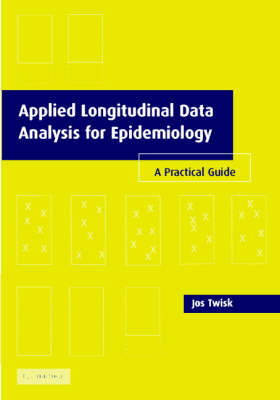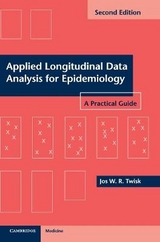
Applied Longitudinal Data Analysis for Epidemiology
A Practical Guide
Seiten
2003
Cambridge University Press (Verlag)
978-0-521-81976-3 (ISBN)
Cambridge University Press (Verlag)
978-0-521-81976-3 (ISBN)
- Titel erscheint in neuer Auflage
- Artikel merken
Zu diesem Artikel existiert eine Nachauflage
In this book the most important techniques available for longitudinal data analysis are discussed, including simple techniques such as the paired t-test and summary statistics, and more sophisticated techniques such as generalised estimating equations and random coefficient analysis. This practical guide is suitable for non-statisticians involved in medical research and epidemiology.
In this book the most important techniques available for longitudinal data analysis are discussed. This discussion includes simple techniques such as the paired t-test and summary statistics, but also more sophisticated techniques such as generalised estimating equations and random coefficient analysis. A distinction is made between longitudinal analysis with continuous, dichotomous, and categorical outcome variables. It should be stressed that the emphasis of the discussion lies on the interpretation of the different techniques and on the comparison of the results of different techniques. Furthermore, special chapters will deal with the analysis of two measurements, experimental studies and the problem of missing data in longitudinal studies. Finally, an extensive overview of (and a comparison between) different software packages is provided. It is important to realise that this book is a practical guide and especially suitable for non-statisticians.
In this book the most important techniques available for longitudinal data analysis are discussed. This discussion includes simple techniques such as the paired t-test and summary statistics, but also more sophisticated techniques such as generalised estimating equations and random coefficient analysis. A distinction is made between longitudinal analysis with continuous, dichotomous, and categorical outcome variables. It should be stressed that the emphasis of the discussion lies on the interpretation of the different techniques and on the comparison of the results of different techniques. Furthermore, special chapters will deal with the analysis of two measurements, experimental studies and the problem of missing data in longitudinal studies. Finally, an extensive overview of (and a comparison between) different software packages is provided. It is important to realise that this book is a practical guide and especially suitable for non-statisticians.
Dr Jos W. R. Twisk is Senior Researcher and Lecturer in the Department of Clinical Epidemiology and Biostatistics and the Institute for Research in Extramural Studies, Vrije Universitiet, Medical Centre, Amsterdam.
1. Introduction; 2. Study design; 3. Continuous outcome variables; 4. Continuous outcome variables - relationships with other variables; 5. Other possibilities to model longitudinal data; 6. Dichotomous outcome variables; 7. Categorical and 'count' outcome variables; 8. Longitudinal studies with two measurements: the definition and analysis of change; 9. Analysis of experimental studies; 10. Missing data in longitudinal studies; 11. Tracking; 12. Software for longitudinal data-analysis; 13. Sample size calculations; Index.
| Erscheint lt. Verlag | 27.3.2003 |
|---|---|
| Zusatzinfo | 159 Tables, unspecified; 54 Line drawings, unspecified |
| Verlagsort | Cambridge |
| Sprache | englisch |
| Maße | 181 x 256 mm |
| Gewicht | 832 g |
| Themenwelt | Studium ► Querschnittsbereiche ► Epidemiologie / Med. Biometrie |
| ISBN-10 | 0-521-81976-8 / 0521819768 |
| ISBN-13 | 978-0-521-81976-3 / 9780521819763 |
| Zustand | Neuware |
| Informationen gemäß Produktsicherheitsverordnung (GPSR) | |
| Haben Sie eine Frage zum Produkt? |
Mehr entdecken
aus dem Bereich
aus dem Bereich
ein überfälliges Gespräch zu einer Pandemie, die nicht die letzte …
Buch | Hardcover (2024)
Ullstein Buchverlage
24,99 €



